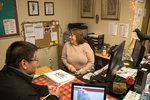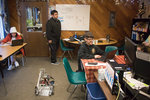

Futurus High School has never before had a robotics program, but thanks to a grant allowing it to participate in the FIRST Tech Challenge, the high school now has a four-member team.
“I thought that this would be a good opportunity for students to connect with the community through the mentorships and fundraising and things like that, as well as connect with one another and be part of a really cool endeavor,” said James Bowers, administrator and teacher at Futurus High School.
FIRST Tech Challenge is a competition that will take place in Olympia this Saturday, where high school students can come test their robotics skills. When the Nano Knights — the official team name — started their team in November, two of the students had minimal experience with building or robots. The other two didn’t have any experience at all.
“There were some frustrations,” said team mentor Tina Christenson. “There were some walkouts.”
Last week, however, the Nano Knight’s robot took its first steps.
“I was at lunch when they came and told me,” Christenson said. “‘It moved! It moved!’”
When student and team leader Joey Rivas was asked how long it took to build the robot, he said “Oh, it took awhile.” Actually, though, the students spent less than a month building their now nearly competition-ready robot.
What remains in the days leading up to Saturday’s competition is some more programming.
“Right now we are just making little adjustments so that our robot can actually push things to corners or get to where it’s supposed to,” Rivas said. “(The robot can) go forward, turn, but that’s with the controller. The arm can move up and down, it can drop things, but we still haven’t got it to pick up things right now. So that’s what we’ll work on.”
Currently, a controller moves the robot, but the team hopes to make the robot autonomous by this weekend. One of their competitions is a 30-second autonomous challenge where the students push a button and the robot will leave its box, go to a corner of the arena and drop off a little mascot for the team to claim that corner as their own.
“We’re just doing the final modifications and tying up some wires,” Christenson said. “We’re learning as we go how to program.”
There is another two-minute challenge that involves the robot picking up minerals in the arena.
“We get points for keeping certain minerals in a certain area and keeping minerals in their assigned spot,” student Presley Alexander said.
This program at Futurus began because of a $2,750 “FIRST Tech Challenge” grant from FIRST Washington. The grant provided enough funds for Bowers to purchase a robotics kit and other items the school needed, as well as the registration fee. The district does not currently fund the program.
“This is the first year (at Futurus),” Bowers said. “I started a robotics program at (Centralia High School) four years ago, but this is the first one here. We applied for the grant and got it, so we ended up with a robotics team. So now we have students that are, I believe, into it and enjoying it and ready to go try this out. This robotics competition is not so much a competition as much as a collaboration.”
Bowers calls it a collaboration, he said, because it isn’t uncommon for a rookie team to join these robotics competitions.
“They are encouraged to come if they have their bot moving or not,” Bowers said. “What happens is the other team advisers and other students come around and help you get it going right there at the competition. They look at your program, your coding. … There are a lot of elements of collaboration that exist and it’s really fun to watch and be a part of.”
Currently, Christenson is the team’s only mentor. So far, Bowers said, Christenson and the students have learned how to build and program the robot on their own. Futurus is looking for more mentors to help its students.
“We look for people who want to give their time, with patience and understanding to students who are interested and eager to improve upon their own skills,” Bowers said. “So the skill set that might have to come from a mentor might be something along the lines of some sort of programming or material science design, or something to that effect.”
To become a mentor, call James Bowers at 360-827-6430 or email him at jbowers@centralia.wednet.edu.